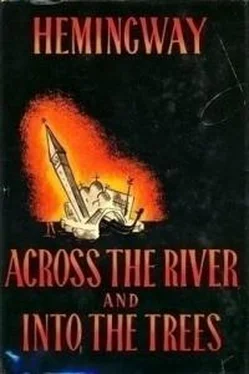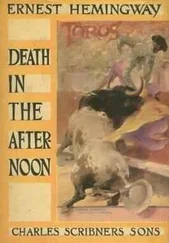'The other leaders?'
'Let us not name them. They've named themselves enough in their memoirs. Mostly extremely plausible out of something called the Rotary Club that you would never have heard of. In this club, they have enamelled buttons with their first names and you are fined if you call them by their proper names. Never fought. Ever.'
'Were there no good ones?'
'Yes, many. Bradley, the schoolmaster, and many others. Give you Lightning Joe as a good one. Very good.'
'Who was he?'
'Commanded the Seventh Corps when I was there. Very sound. Rapid. Accurate. Now chief of staff.'
'But what about the great leaders we heard about like the Generals Montgomery and Patton?'
'Forget them, Daughter. Monty was a character who needed fifteen to one to move, and then moved tardily.'
'I always supposed he was a great General.'
'He was not,' the Colonel said. 'The worst part was he knew it. I have seen him come into an hotel and change from his proper uniform into a crowd–catching kit to go out in the evening to animate the populace.'
'Do you dislike him?'
'No. I simply think he is a British General. Whatever that means. And don't you use the term.'
'But he beat General Rommel.'
'Yes. And you don't think anyone else had softened him up? And who can't win with fifteen to one? When we fought here, when we were boys, the Gran Maestro and I, we won for one whole year with three to four against one and we won each one. Three main bad ones. That is why we can make jokes and not be solemn. We had something over one hundred and forty thousand dead that year. That is why we can speak gaily and without pomposity.'
'It is such a sad science; if it is a science,' the girl said. 'I hate the war monuments, though I respect them.'
'I do not like them either. Nor the process which led to their construction. Have you ever seen that end of the thing?'
'No. But I would like to know.'
'Better not know,' the Colonel said. 'Eat your steak before it gets cold and forgive me for talking about my trade.'
'I hate it but I love it.'
'I believe we share the same emotions,' the Colonel said. 'But what is my pitted compatriot thinking three tables down?'
'About his next book, or about what it says in Baedeker.'
'Should we go and ride in a gondola in the wind after we have dined?'
'That would be lovely.'
'Should we tell the pitted man that we are going? I think he has the same pits on his heart and in his soul and maybe in his curiosity.'
'We tell him nothing,' the girl said. 'The Gran Maestro can convey him any information we wish.'
Then she chewed well and solidly on her steak and said, 'Do you think it is true that men make their own faces after fifty.'
'I hope not. Because I would not sign for mine.'
'You,' she said. 'You.'
'Is the steak good?' the Colonel asked.
'It's wonderful. How are your scaloppine?'
'Very tender and the sauce is not at all sweet. Do you like the vegetables?'
'The cauliflower is almost crisp; like celery.'
'We should have some celery. But I don't think there is any or the Gran Maestro would have brought it.'
'Don't we have fun with food? Imagine if we could eat together always.'
'I've suggested it.'
'Let's not talk about that.'
'All right,' the Colonel said. 'I've made a decision too. I'm going to chuck the army and live in this town, very simply, on my retirement pay.'
'That's wonderful. How do you look in civilian clothes?'
'You've seen me.'
'I know it, my dear. I said it for a joke. You make rough jokes sometimes too, you know.'
'I'll look all right. That is if you have a tailor here who can cut clothes.'
'There isn't one here, but there is in Rome. Can we drive together to Rome to get the clothes?'
'Yes. And we will live outside the town at Viterbo and only go in for the fittings and for dinner in the evening. Then we'll drive back in the night.'
'Will we see cinema people and speak about them with candour and perhaps not have a drink with them?'
'We'll see them by the thousands.'
'Will we see them being married for the second and third time and then being blessed by the Pope?'
'If you go in for that kind of thing.'
'I don't,' the girl said. 'That's one reason that I cannot marry you.'
'I see,' the Colonel said. 'Thank you.'
'But I will love you, whatever that means, and you and I know what it means very well, as long as either of us is alive and after.'
'I don't think you can love very much after you, yourself, are dead,' the Colonel said.
He started to eat the artichoke taking a leaf at a time, and dipping them, heavy side down, into the deep saucer of sauce vinaigrette .
'I don't know whether you can either,' the girl said. 'But I will try. Don't you feel better to be loved?'
'Yes,' the Colonel said. 'I feel as though I were out on some bare–assed hill where it was too rocky to dig, and the rocks all solid, but with nothing jutting, and no bulges, and all of a sudden instead of being there naked, I was armoured. Armoured and the eighty–eights not there.'
'You should tell that to our writer friend with the craters of the moon face so he could write it to–night.'
'I ought to tell it to Dante if he was around,' the Colonel, suddenly gone as rough as the sea when a line squall comes up, said. 'I'd tell him what I'd do if I were shifted, or ascended, into an armoured vehicle under such circumstances.'
Just then the Barone Alvarito came into the dining–room. He was looking for them and, being a hunter, he saw them instantly.
He came over to the table and kissed Renata's hand, saying, 'Ciao, Renata.' He was almost tall, beautifully built in his town clothes, and he was the shyest man the Colonel had ever known. He was not shy from ignorance, nor from being ill at ease, nor from any defect. He was basically shy, as certain animals are, such as the Bongo that you will never see in the jungle, and that must be hunted with dogs.
'My Colonel,' he said. He smiled as only the truly shy can smile.
It was not the easy grin of the confident, nor the quick slashing smile of the extremely durable and the wicked. It had no relation with the poised, intently used smile of the courtesan or the politician. It was the strange, rare smile which rises from the deep, dark pit, deeper than a well, deep as a deep mine, that is within them.
'I can only stay a moment. I came to tell you that it looks quite good for the shoot. The ducks are coming in heavily from the north. There are many big ducks. The ones you like,' he smiled again.
'Sit down, Alvarito. Please.'
'No,' the Barone Alvarito said. 'We can meet at the garage at two–thirty if you like? You have your car?'
'Yes.'
'That makes it very good. Leaving at that hour, we will have time to see the ducks in the evening.'
'Splendid,' the Colonel said.
'Ciao, then, Renata. Good–bye, my Colonel. Until two–thirty.'
'We knew each other as children,' the girl said. 'But he was about three years older. He was born very old.'
'Yes. I know. He is a good friend of mine.'
'Do you think your compatriot has looked him up in Baedeker?'
'I wouldn't know,' the Colonel said. ' Gran Maestro ,' he asked, 'did my illustrious compatriot look up the Barone in Baedeker?'
'Truly, my Colonel. I have not seen him pull his Baedeker during the meal.'
'Give him full marks,' the Colonel said. 'Now look. I believe that the Valpolicella is better when it is newer. It is not a grand vin and bottling it and putting years on it only adds sediment. Do you agree?'
'I agree.'
'Then what should we do?'
'My Colonel, you know that in a Great Hotel, wine must cost money. You cannot get Pinard at the Ritz. But I suggest that we get several fiascos of the good. You can say they come from the Contessa Renata's estates and are a gift. Then I will have them decanted for you. This way, we will have better wine and make an impressive saving. I will explain it to the manager if you like. He is a very good man.'
Читать дальше
Конец ознакомительного отрывка
Купить книгу












